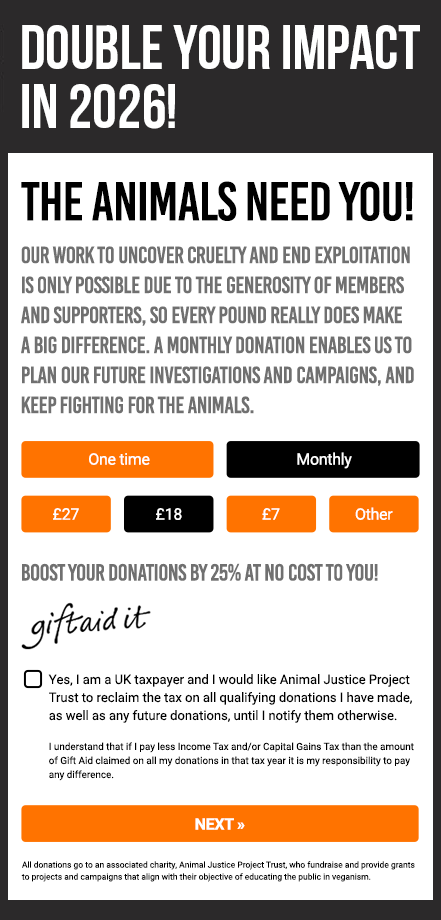
Fishing Hurts
What is wrong with fish farming?

Blog written by Claire Hamlett, a freelance journalist and contributor
The average person eats almost twice as much fish as people did fifty years ago. Combined with a growing human population, this increasing demand has led to overfishing of many fish species, reducing their free-living communities to critical or endangered levels. Aquaculture, or fish farming, is supposed to be a sustainable alternative, preventing ‘overfishing’ and avoiding the problem of bycatch – the accidental, often deadly, capture in industrial fishing gear of non-target animals like whales, sharks, and turtles.
Fish farming has boomed in the past two decades, growing from 16.8 million tons of fish killed in 1990 to 106 million tons in 2015. But though it has become the dominant source of fish for human consumption, the amount of fish caught from the wild has not reduced, having remained steady at about 90 to 95 million tons a year since the 1990s. The industry does not count the individual fish, only by weight. Not only has fish farming failed to displace the plundering of life from the oceans, it has given rise to a whole host of other problems too.

What is fish farming?
Fish farms come in several forms, including closed systems that artificially recirculate the water which can be located either onland or suspended in a water body like a lake, and open systems like large cages that are positioned out at sea, allowing water to flow more naturally through them. Carp, catfish, and salmon are among the most common species farmed globally. In the UK, Atlantic salmon are the main type of fish farmed, mostly around the Scottish coast.
The fish begin their lives in hatcheries. They spend time growing in freshwater tanks before they are transferred to farms at sea, where they remain for a year or two before slaughter. Fish farms tend to be intensive, industrial operations with up to 50,000 fish held together in one cage.

What are fish farms like for the fish?
The intelligence and emotional capacities of fish are often underestimated, but studies have shown they are not only likely to be sentient, but they can recognise themselves in a picture or mirror, feel fear, can solve problems and invent their own tools. Some also have incredible physical prowess, and for a species like Atlantic salmon, farms can be a stressful and frustrating environment. As migratory fish, salmon swim great distances through the oceans and rivers over the course of their natural lifespan of around 13 years. In a cage, they swim only in circles.
High stocking densities also brings other welfare problems. Parasitic sea lice which would normally be washed off the salmon as they swim through freshwater can infest fish farms, and can cause pain and death without treatment. But the treatments aren’t great either, generally involving bathing the fish in abrasive chemicals, to which the lice have started building resistance, or putting them through a warm water treatment system, which can cause eye damage and death to the fish. Wrasse, another species of fish, are kept in the cages to ‘clean’ the salmon by eating the lice off them, but they often suffer and die from stress, starvation, or bullying by other fish.
Food is withheld from fish to empty their guts before stressful procedures including transport and slaughter, in some cases for as long as two weeks. Slaughter methods are also barbaric. Fish may be taken out of the water and left on ice to suffocate, gassed with carbon dioxide, have their gills cut while still conscious, or be clubbed to death. The fish farming industry sets its own standards for ‘humane’ slaughter meaning they are more likely to decide their methods based on efficiency and cost..

How are farmed fish fed?
While fish farming was supposed to reduce pressure on free-living fish populations, farming carnivorous fish like salmon and trout has actually been doing the opposite. Fish like mackerel, sardines, and anchovies are being caught from the oceans to be turned into feed, with much of this catch being diverted from feeding people in the Global South. A report by Feedback Global calculated that 179,000 tonnes of salmon produced in Scottish aquaculture farms in a year required fish meal and fish oil produced from 460,000 tonnes of wild-caught fish.
Fish feed increasingly includes ingredients like soy and wheat, which is posited as a sustainable alternative to fishmeal. But researchers have warned that this is only likely to increase the amount of these crops already grown to feed land animals who are farmed.
What are the environmental impacts?
The pollution from open water fish farms is a huge problem. The toxic mix of chemicals used to treat lice and fish feces from the tightly-packed fish seep out into marine environments and harm wildlife. Sea lice are now more of a problem from free-living salmon that pass close to fish farms, and Scotland’s environment agency now wants to introduce protection zones around many farms to protect the free-living individuals. Thousands of fish escape from farms every year, risking the introduction of diseases and genetic problems when they breed with free-living fish.
Until 2021, British fish farms could obtain licenses to shoot seals to stop them from breaking into cages to feed on the captive salmon. But acoustic deterrent devices used to scare of seals can harm other animals like harbour porpoises.
Fish farming is immensely destructive to the environment and creates unfathomable suffering for the fishes who are farmed. It is not a solution for ‘overfishing’. We must continue campaigning to end both fish farming and the catching of ocean life because Fishing Hurts.
As always,
For the animals.

.png)


.png)







wide.jpg)





.png)